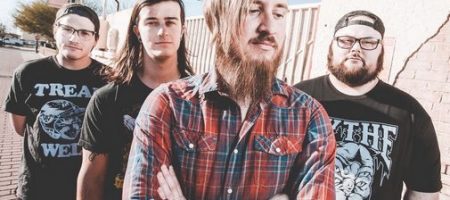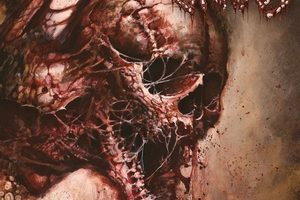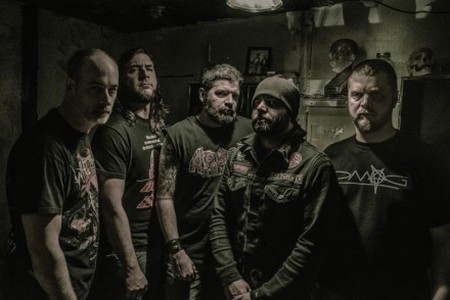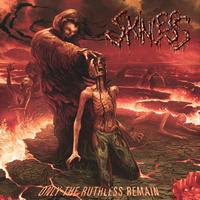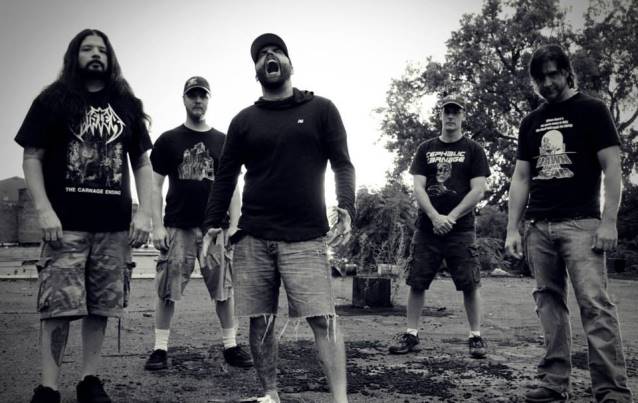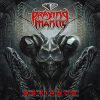Skinless – A New Age of Savagery
Sunday, 27th May 2018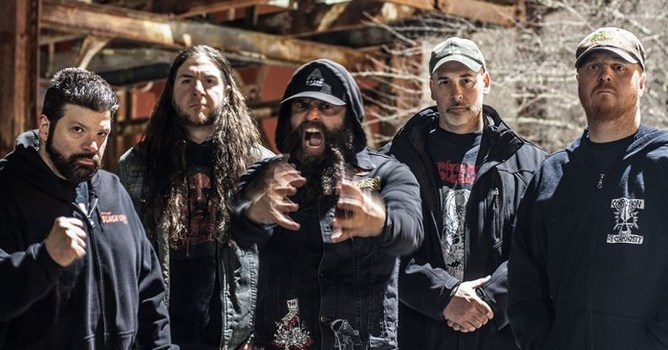
Veteran upstate New York death metal act Skinless put out their first album since the reformation of their ‘classic’ line-up in 2011 with Only the Ruthless Remains. A punishing reminder of the band’s distinctly heavy form of brutal death metal. In an age of bands returning to their stomping grounds, we are seeing more bands come back but then quickly fade once more into the sunset after the ‘comeback.’ Not so for Skinless.
Earlier this month, Skinless released their sixth album (and follow-up to Only the Ruthless Remains), Savagery. Long-time fans already know what to expect from the act, and they have once again delivered in spades. The aptly named album is gritty, dark, and heavy as nails. In an era of flashiness, Skinless delivers a blunt and forceful beatdown. We grabbed vocalist Sherwood Webber for a Q & A to talk more of the details of their latest release, the New York death metal sound, and his continued work with Denver Black Sky.
Dead Rhetoric: The album after the ‘comeback’ record can be challenging. How’d you approach it?
Sherwood Webber: I think the guys were just really fired up to keep writing. They had some momentum coming off the last one, and we had a bunch of good shows. I think it might be the quickest we’ve ever turned around a record. Maybe the process of the last one was fresh in everyone’s mind. There was a lot of inspiration and ideas floating around. They kept it coming my way, and I would write stuff as I had time, and shoot them back demos in the meantime. I think it was just the right time to be cranking out some tunes.
Dead Rhetoric: So do you feel the band is revitalized in a way?
Webber: Yeah, I think we learned a lot because our last record was the first one with Dave [Matthews], and having him become more of a contributor to the band helped us become more cohesive. It’s also our second full-length record with Tom Case. We learned a lot in the process from Only the Ruthless Remain, so there was a comfort level going into this one that put everyone more at ease and ready to have more fun. I can’t say that any of our records have been particularly stressful or anything, but this one had a really relaxed vibe as we created and recorded it. I think that lends itself to a more natural sounding record.
Dead Rhetoric: Could you talk about what went into the “Skull Session” video. It seems right up your alley in terms of humor.
Webber: It’s funny because it’s a video that in my professional life, I have been passing the link around, and people who don’t know me from Skinless and know me from being a production manager – the way I summed it up to them was, “If you want to know what this band is all about for the past 25 years, this 5 minutes will do it for you.” The video has all of that stuff. It’s got the beer-chugging and the brutality, it’s got the humor and the heaviness of it all. To me, it’s a really good calling card for the band, whether you have been involved from the beginning or you are brand new and don’t even listen to metal, as is the case with many people I’ve been showing it to lately. They are definitely surprised and entertained by it.
Dead Rhetoric: What did it feel like to make it past the 25 year mark for the band?
Webber: Good, although as time goes by, it doesn’t really seem that long. It’s just been a part of our existence for so long that it is what it is. 25 years when you are 16 years old seems like a very long time, but I’m the last one to reach 40 in the band this coming summer, so it’s just another number I guess [laughs].
Dead Rhetoric: The title of Savagery is pretty blunt, and the cover art is quite brutal. What can you say about that image?
Webber: Again, I think back to the cohesion factor in that it was a more relaxed recording session…we had the artwork as we had started recording the record. I printed it out and put it in the studio. We had the imagery out and people picking it up and looking at it as we were doing our respective tracks. It was ingrained in what we were doing, and I feel that kind of lends to how it sounds and what it is. The cover really matches the grit of the record, and vice versa. Having known that sometimes the cover is an afterthought, or having an artist in mind and just knowing they will come up with something great. The way that we have done it with Savagery, which is far from a concept record, but having that tone and concept in mind as you are recording it, I felt it was vital to the outcome.
Dead Rhetoric: That makes sense, because you see that cover piece and you have to aim to match that level of intensity. I don’t think I’ve heard too many bands talk about doing it that way.
Webber: Right, and we’ve never done it that way before. I think it happens the opposite way – you compose the record and you are either scrambling to have an artist see your vision or you are presenting them with a couple of concepts. In this case, Jesse [Levitt] had already done the art and we loved it, and it was part of the record from the get-go. It was awesome.
Dead Rhetoric: Where’d the Crowbar cover idea stem from? It does seem to make sense with the band, with that chunky feel to it.
Webber: I think everyone in the band is a fan of Crowbar. Noah [Carpenter] and I, when we first started hanging out, I was 15-16 years old and we would go to record stores, and went at that time, tape shopping. We picked up that record [Crowbar] and were jamming it in his car. That record in particular was always a staple in my catalog. When he reached out to me and said he wanted to do this cover, I jumped out of my boots at the chance. Next step is giving it to Kirk [Windstein], the riff master, so he can hear it and see what he thinks.
Dead Rhetoric: Going back all the way to Foreshadowing our Demise, that intro “Life Sucks…and Then You Die” has sort of synonymous with the band. Why do you think that is?
Webber: It was just catchy – it was a Vince McMahon sample. I know there’s another band that actually put it into their song, I don’t think it was a result of Skinless – maybe they just came up with it on their own. But I see that circulating quite a bit. People telling us that someone ripped us off, but it was a good sample and a call to action for that song [“The Optimist”]. A lot of people associate us with that.
Dead Rhetoric: As you are getting older, where’s the draw for death metal at this point in your life?
Webber: That’s another funny concept, how things don’t really change. Maybe at some point you would expect to grow out of it, but for me personally, and the band, we’ve only grown closer with metal. It’s just like, fuck, I can’t get enough of the stuff still. I’m always looking for the new records, and you look at bands like Obituary, Suffocation, and Immolation – they are all putting out amazing records. A lot of those bands are 8-10 years ahead of us in our age group. It’s pretty amazing the level of dedication that the bands have, but also the fans of the genre. It’s stronger than ever. It’s crazy.
Dead Rhetoric: So what are your thoughts on New York Death Metal as a sound?
Webber: In the ‘90s there was Immolation and Suffocation, and beyond that came Internal Bleeding and Pyrexia. We were kind of the next generation of that in New York. Of course, you have to mention Mortician. There were so many great bands, and being in close proximity to New York City, we enjoyed going to shows at those NYC venues, and having those bands brought up to the upstate region. As a sound, every region had its own. We were so close with hardcore too. You can’t understate the influence of hardcore and metal had on each other in those areas because the New York sound definitely had a beatdown to it that maybe the Tampa sound didn’t. That was definitely the crossover with a lot of the hardcore bands that were present.
Dead Rhetoric: I think that applies to the live setting too. That upstate NY/Massachusetts area had that really energetic feel when you look back on it.
Webber: 100%. It was a great scene. I mean, it still is to a degree. Some people say that it has slowed down, but these things come in waves, and I am definitely looking forward to the next upswing of the whole thing.
Dead Rhetoric: Have you seen kind of a growth with Denver Black Sky due to the region that it’s located it? It doesn’t seem like there’s as much out there in that region?
Webber: Yeah, there is a growth but it’s difficult because we are isolated out here. A lot of bands have to be flown in, which eats up a ton of the budget off the bat, or they have to drive a long distance. It has its disadvantages, as compared to say, Maryland, where you have access to all those east coast bands and a lot of bands that you can get in there a little more efficiently.
That said, it has its advantages too, because people definitely want to come to Denver for a variety of reasons, whether its beer or weed or just a vacation. The sunny skies and mountain life. Whatever the reason they want to get here, we have all those things. It’s always a struggle and it’s year by year. Some years we do better than others, and that depends a little on the availability of a lot of bands. Last year was a particularly tough Denver Black Sky to put together because every band was out on tour. If they were just here 2 months ago, it didn’t make sense to put them on our show.
Dead Rhetoric: Can it be expected that Skinless shows are more of a rarity at this point – scattered shows when you can?
Webber: I don’t see us being able to play a ton more. We have jobs and kids, and everything else. Kids are the big one. You just can’t leave your kid at home, for a number of reasons. You really don’t want to. A lot of times, I think about it and we get offered a lot of tours – full on, come to Europe for 5 weeks. It’s just not possible. I think about how much I love beer and metal, and I wouldn’t really trade it for time with my kids. It’s a balance that we all have to make sacrifices to work on, but it’s worth it.
Dead Rhetoric: I know there are a couple shows coming up. What other plans for Skinless now that the album is out?
Webber: We are just looking at the fall, and then hopefully get back to Denver and maybe some regional shows. Regional meaning Texas, or whatever we can put together. We are doing some festivals – we are doing the Quebec Metalfest and the California Deathfest, so we are stoked on those. It all works out one way or another.
Dead Rhetoric: Do you feel by doing those shorter spurts of shows, you hear more about people traveling a further distance so that they can see you?
Webber: Yeah, we definitely see those folks that go an extremely long distance to make it happen – knowing that the opportunities are going to be so few. If I had my way, it would be awesome to do a full US tour and do it right. Get all those people that don’t have the time, or same reasons that we have as a band – they can’t just hop on a plane to get to us. There’s trade-offs and I would love to do a proper tour but it’s just not in the cards.











